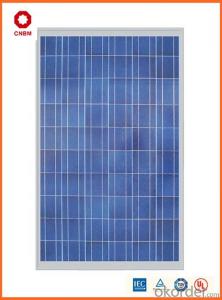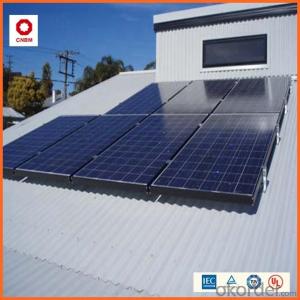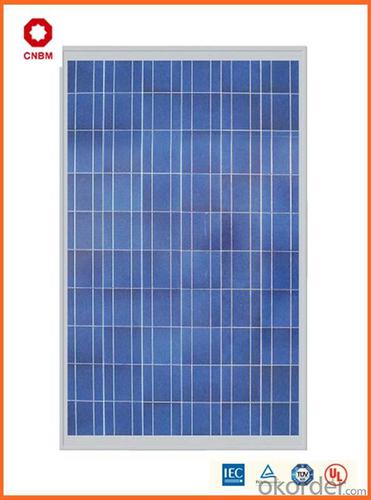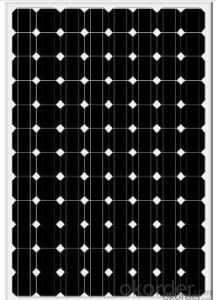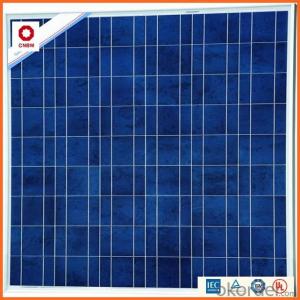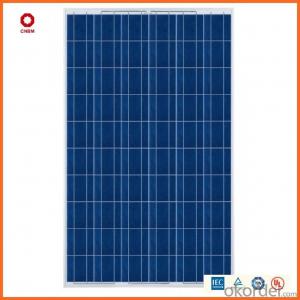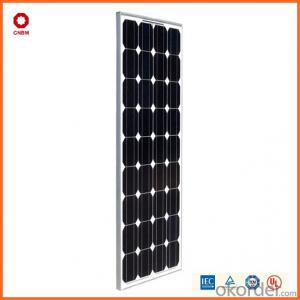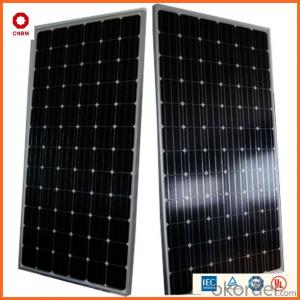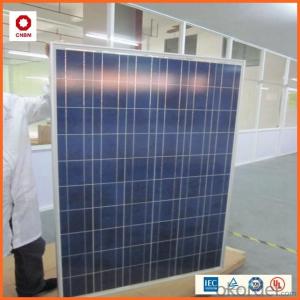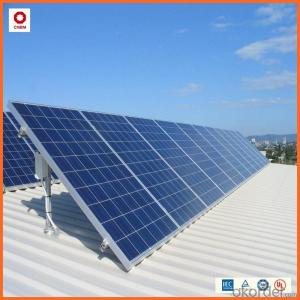Best Solar Panels To Buy for Home - 80w Monocrystalline Silicon Solar Module with CE/IEC/TUV/ISO Approval Standard Solar
- Loading Port:
- China main port
- Payment Terms:
- TT OR LC
- Min Order Qty:
- 100 watt
- Supply Capability:
- 1000000 watt/month
OKorder Service Pledge
OKorder Financial Service
You Might Also Like
Specification
Solar 80W Monocrystalline Silicon Solar Module With CE/IEC/TUV/ISO Approval Standard Solar
CNBM International Corporation is a professional solar panel manufacturer in China for CNBM brand . Silicon panel ( silicon module), as our main product, has high quality and good service. Our products are very popular in Europe, Australia, England, Middle East, Mexico, Argentina, Chili, Singapore and Africa.
Furthermore, our products have gained international authorized certificates like TUV, UL and CE.
China National Building Material (Group) Corporation (CNBM), established in 1984, is one of the largest State-owned group corporations of building & mechanical materials which specializes in the design, manufacturing and distribution of building materials in the world.
As the whole world turns “green”, CNBM enters into the Photovoltaic Industry in 2005.After 6 years' fast growth, now our annual capacity is 500MW solar panel and 500MW solar cell.
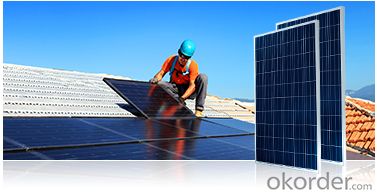
We now provide
• Monocrystalline Solar Panel
• Polycrystalline Solar Panel( multicrystalline silicon Solar Panel)
Features of our products:
Long lifespan: 25Years lifetime guarantee, 12years workshop warranty. 90% output in first 10years. 85% output in next 15years.If module fail during warranty period, please contact local dealer, and provide the warranty card to replace the products.
Solar panels are withstand extreme working condition (from -40°C to 120°C)
Grade A solar panels rated by TUV.
High transformation efficiency solar panels
New UV reflector protected Layer
Maintenance free solar panels
No exposed metal parts
Custom-made available
100% EL TEST before and after laminator for each solar panels
TUV,MCS,CEC,IEC61215,IEC61730,CE,UL approved solar panels
CHUBB insurance company to guarantee the quality of solar panels
Bankable solar panels in German,Italy,UK,Denmark country
As a professional Solar Panel manufacturer and Supplier in China, we have our customers come around the whole world and our specialization has got a worldwide recognition. Meanwhile, with our superior quality, competitive price, prompt and excellent service, As main role in trade section of CNBM Group, CNBM International Corporation supplies products including Monocrystalline Solar Panel, Polycrystalline Solar Panel ( multicrystalline silicon Solar Panel) have received and enjoyed famous reputation in many countries and regions in the world.
- Q: I am trying to built a circuit that will power two USB ports (both 5V and 0.5 amps) from the output of a solar panel that produces 20V at 0.2 amps. I have a voltage regulator that runs at 5v and 0.5 amps but I can't figure out the best way to boost the current up to 0.5 amps before I incorporate the voltage regulators.
- The previous answer about wattage is correct, so this is your first problem. Try increasing the number of solar panels by connecting them in parallel. To answer your question about increasing current, a voltage regulator wastes energy to regulate voltage. You need somthing that is not so wasteful, and that is a DC-DC converter. You will need to buy a 20V-5V model. this will give you less voltage but more current than you origionally had with your solar panel. You can alter voltage and current capacity, but you cant increase power (watts) with a DC-DC converter.
- Q: was looking at a few different sites, here is one of them
- The okorder / and may also be downloaded as a bittorrent (put solar panel or solar energy into a torrent search engine).
- Q: I have several 6v 4.5a sealed lead acid batteries. I would like to hook one of them up to a solar panel and have it stay charged from the solar panel all the time, but not overcharged. Is there a simple way to do this with an IC or something? I am only a beginner with circuits so I want it to be something very easy to make. Basically, I want it to stay charged all the time so it's available if I need it for a power out or something.Thanks.
- Yes, you can purchase a solar photovoltaic array to keep your batteries charged. You will need a Photovoltaic Cell Panel that produces 27 + watts (6volts x 4.5 amps = 27 watts) at 6 volts of electricity, a Charge Controller that allows only 4.5 amps of power through to the battery and will reduce the amps as the battery nears full charge and shut off the Panel when the battery is fully charged, and a 6v. Battery. Figure you will need a photovoltaic panel capable of producing a minimum of 27 watts if you are going to charge a completely dead 6 v. battery in one day. (with a clear sky). The way the system works is the sunlight strikes the cells on the panel and releases the excess electrons in the cells, they travel along central wires to your battery and charge the battery. When the sun sets, the procedure is reversed and the electrons flow backwards from the battery, into the photovoltaic cells. That is where the Charge Controller is needed. It acts a one way gate and lets the electrons go into the battery, but won't let them go backwards to the Panel. Just set your panel in the sun at the optimum angle for the season and your latitude on earth, connect the charge controller and then the battery, and it will keep your battery charged. Don't waste your money on the small wattage solar photovoltaic systems that claim to keep your battery charged. They simply can't do it unless your battery is in like new condition and is fully charged when they are hooked up. If you battery is a few months old, the small wattage photovoltaic systems can't keep up with the loss of power from sulfation inside the battery.
- Q: How to Compare Solar Panels? ?
- Each okorder may help you
- Q: I need to write a pressuasive essay on why we should use solar panels more than we do. and convince people that their good and stuff.. if u guys could give me some good key reasons why..that would be great.
- Right now, the U.S. government and some state governments (like California) are offering subsidies on solar panels for businesses and houses. With these subsidies, anyone infesting in solar power today will have their investment returned in less than 0 years. This means that with these subsidies, solar panels are basically paying for themselves; they're free. In addition, excess power generated on solar panels can be added to the local power grid and, if you're lucky and can set it up with your local power distributor, the power company will pay you for the power you generate. This are just financial reasons. Their is also the reduction of power generated by fossil fuels when using solar power which mitigates climate change.
- Q: I have heard a lot about solar panels and I want to know how these solar panels works and is it really possible to generate electricity using solar panels. And what is the cost of getting a solar panel installed?
- They consist of a semiconductor junction which has an uneven distribution of charge so it has an electric field in it. When light hits the material, an electron is knocked off from its parent atom and can move around the material. The electric field pushes it in one direction, et voila. You have current! (it's most complicated than that, but it needs quantum physics to understand). In summary, light goes in and DC electricity comes out of the panel. To use it in your house you will need an inverter as well, which turns it into useful AC. Then you need a way of using up the extra electricity you produce when it's sunny but you're not using power Some people use batteries, most people use 'grid tied' systems, plug in to the national grid and sell electricity to power companies that you're not using! Unfortunately, without major subsidies (like those offered in Germany, Japan and soon the UK), solar panels aren't likely to be cost effective. In the UK it costs about ?5-6,000 to install a kWp of solar power and it will make about ?90 of electricity a year. In California it's sunnier, so would make about ?200 of electricity a year, but it's still very VERY expensive without subsidy. On the plus side, technology is improving. Thin film technology can be done at half the price, so I'd say hold on until thin film solar cells go up for sale (right now they only sell them to companies for big projects). Prices should drop by at least half in the coming years if they can make enough to sell to households - and at that price it'll be worth it in places like California.
- Q: Are there any government incentives for installing solar panels?
- Yes, there are several government incentives for installing solar panels. These incentives can vary depending on the country and region, but they often include tax credits, grants, and subsidies. Additionally, some governments may offer net metering programs that allow solar panel owners to sell excess electricity back to the grid, further reducing their energy costs.
- Q: Can solar panels reduce electricity bills?
- Yes, solar panels can reduce electricity bills. By harnessing the sun's energy to generate electricity, solar panels can offset a significant portion of a household's electricity consumption, leading to lower monthly bills. Additionally, excess energy produced by solar panels can be fed back into the grid, allowing homeowners to earn credits or receive payments from utility companies.
- Q: How do solar panels affect the property's resale time?
- Solar panels can positively impact a property's resale time by increasing its value and market appeal.
- Q: How do you know when it is a good deal to buy a solar panel. For example, what is a good cost per watt, how many volts should I expect, etc.
- Both might be bigger. When it is cloudy and little solar (iciness) you'll have a breeze. When it is nonetheless and sunny, you could have the solar. When the batteries are charged, extra vigour from the windmill can also be shunted right into a resistance heater in a water tank, preheating home water, decreasing that price. Downside of windmills: There is a few noise. you do desire a tower of a few form to get above treeline. It's mechanical, so it's going to want periodic renovation and would possibly holiday, or will put on out, or be broken in a windstorm. Panels will final for many years, simply have to be wiped clean of snow within the iciness, and washed off, in case you are living in a dusty subject. They are hard, however the glass can also be damaged.
Send your message to us
Best Solar Panels To Buy for Home - 80w Monocrystalline Silicon Solar Module with CE/IEC/TUV/ISO Approval Standard Solar
- Loading Port:
- China main port
- Payment Terms:
- TT OR LC
- Min Order Qty:
- 100 watt
- Supply Capability:
- 1000000 watt/month
OKorder Service Pledge
OKorder Financial Service
Similar products
Hot products
Hot Searches
Related keywords
